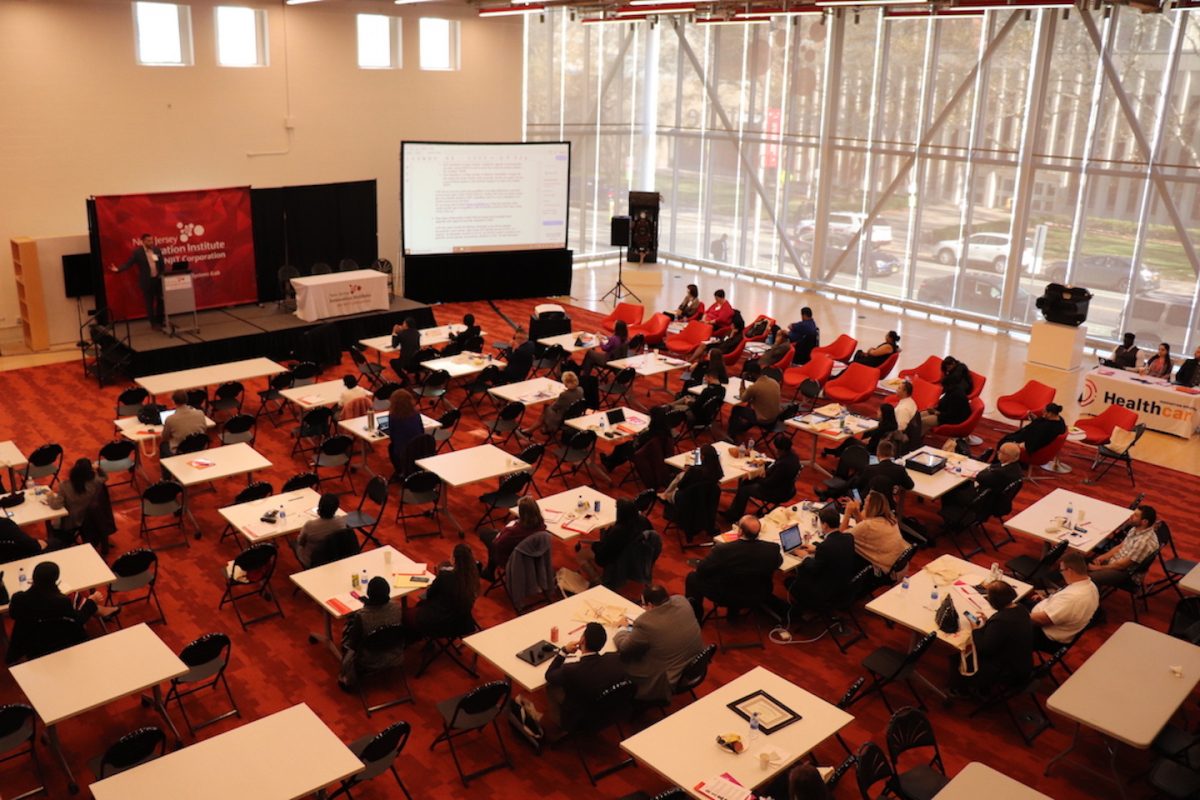Nearly a hundred New Jersey healthcare industry professionals met on the NJIT campus November 6th to discuss how technology and promoting interoperability can help fight the state’s opioid crisis. The conference was hosted by the Healthcare division of the New Jersey Innovation Institute (NJII) and co-sponsored by the state’s Division of Medical Assistance and Health Services (DMAHS) and Department of Health (DOH).
The event – NJII’s 7th Annual Medicaid Conference – drew physicians, practice administrators, technology vendors, hospitals from across New Jersey, as well as representatives from state and federal agencies.
The day was dedicated to helping program participants understand recent updates to Medicaid’s Promoting Interoperability Program. This initiative, formerly known as the Medicare and Medicaid Electronic Health Records Incentive Programs (the EHR Incentive Programs), began in 2011 as a way for the Center for Medicare and Medicaid Services (CMS) to encourage clinicians, eligible hospitals, and Critical Access Hospitals serving rural areas to adopt Certified Electronic Health Record Technology (CEHRT). Using EHRs lead to more efficient information sharing, reduced error rates, and cost savings.
Herminio (Bebet) Navia Jr., the Medicaid Interoperability Lead of the Office of the National Coordinator for Health Information Technology, took to the stage to summarize the impact the interoperability program has had and to discuss some of the follow-on programs and initiatives that build on the foundation it laid.
“We hope that you continue to experience efficiencies and improved health outcomes,” Bebet said. He listed several CMS-approved drives coming up in the next two years that stem from the Health Information Technology for Economic and Clinical Health (HITECH) initiative, which was signed into law in 2009 to support EHR implementation. The new drives center around strengthening the state-wide health information network (NJHIN), by, for instance, helping additional providers connect to it, improving consumer consent to access information and better managing the network’s Perinatal Risk Assessment tool. Electronic Practitioner Orders for Life-Sustaining Treatment (emPOLST) will also be connected and access to emergency medical service, birth and death registries will improve, he said.
Bebet also introduced the Substance Use Disorder Promoting Interoperability Program (SUD PIP) program as another opportunity to build on the foundation of interoperability established by the practices. New Jersey is only the second state in the country to provide funding and incentives to SUD providers to adopt EHR and connect to existing systems.
The initiative, led by the DOH, and the Department of Health and Human Services (DHHS), is open to eligible SUD providers who meet certain requirements – for instance, being licensed by the Department of Health’s Office of Licensing) and having at least 50 SUD admissions in 2018.
NJII is the onboarding partner for the SUD PIP program and interested providers should email sudpip@njii.com for more information. Currently, 60 SUD facilities have signed an agreement to participate. In total, 120 eligible providers can enter the program, which closes in 2021.
Natassia Rozario, the DOH’s director of opioid response and policy spoke passionately about the opioid crisis. She acknowledged that there are enormous health disparities among different populations within the state but was optimistic that technology could be the bridge that closes that divide. She noted that her department is identifying the most vulnerable population at the greatest risk and that “too many lives have been lost, too many families devastated. She showed attendees an online interactive tool that offers with insights and data on drug-related deaths throughout the state. “This is not an issue of those people,” she said. “It’s our people.”
The New Jersey opioid crisis kills 2700 a year. The latest public statistics from the National Institute on Drug Abuse says the death rate is up nearly 30% from 2016. Nationwide statistics are also grim. The National Center for Bioinformatics Information notes that drug overdoses are the leading cause of accidental death in the United States, with opioids being the most common drug. The Center for Disease Control put it even more starkly, blaming prescription and illicit opioids for 47,000 deaths in 2017 – almost 129 per day.
Governor Phil Murphy, who allocated $100 million from his 2019 budget to tackle New Jersey’s opioid crisis, has four key strategies:
- Increase access to evidence-based treatment
- Support individuals on their path to maintenance and recovery
- Build sound data systems and infrastructure
- Curb supply
Rozario emphasized that those four strategies need to be approached with a data-driven mindset, health equity, harm reduction through effective programs, such as promoting access to clean needles, and active listening. She also advocated for the principal of trauma-informed care, which seeks to ensure the physical and emotional safety of an individual is addressed from the beginning.
The Medicaid interoperability Lead from the Office of the National Coordinator for Health Information Technology, Tom Novak, then addressed Medicaid PARTNERSHIP, signed into law last year, and the requirements providers face to receive matching funds. That law, requires all states to have a qualified prescription drug monitoring program (PDMP) in place by October of 2021.
The audience at the Medicaid Conference was invited to ask questions throughout the event, and actively participate. This was especially true when NJII recognized eight health care providers in attendance who’d completed every step of the CMS Promoting Interoperability Program. The Medicare and Medicaid Electronic Health Records Incentive Programs closed to new participants in 2016 and will end in 2021. Participating providers attest annually to having met a variety of eligibility requirements. Throughout New Jersey, 56 physicians from 32 practices completed the program last year.
We look forward to hosting next year’s event and congratulate all the providers who have successfully completed the program.
If you have any questions about the Promoting Interoperability Program, the NJHIN or the SUD PIP program please contact us at info@njii.com.
